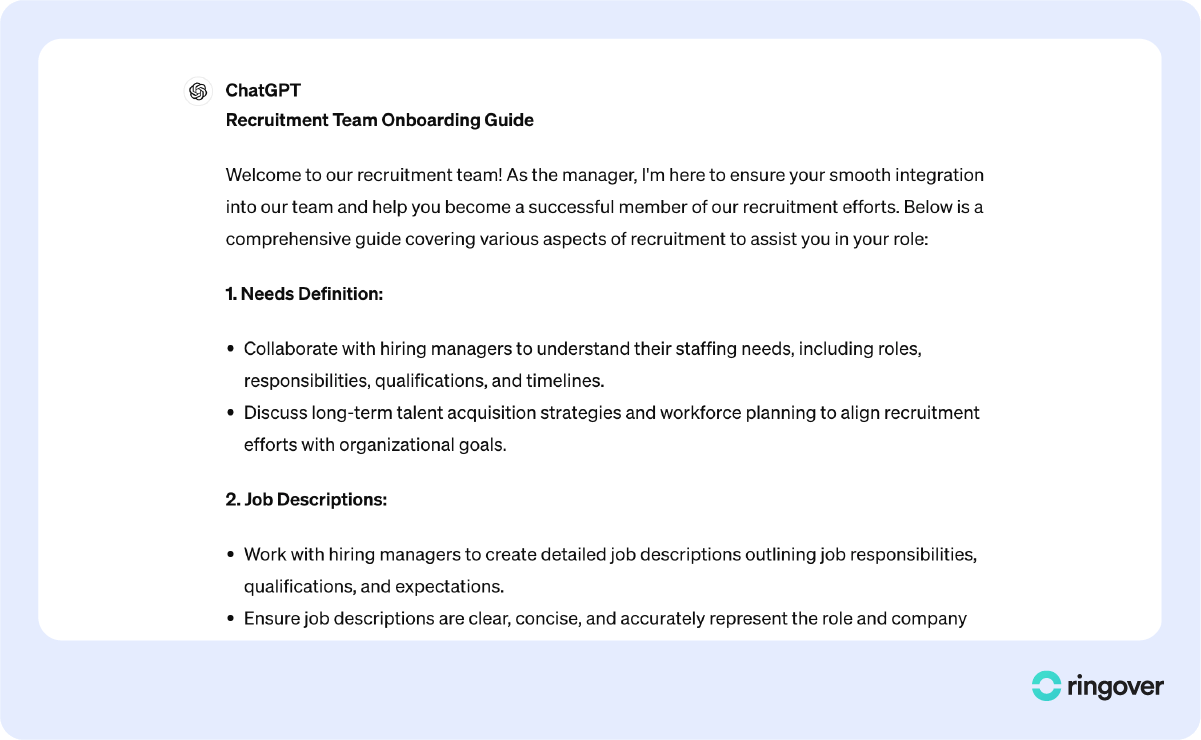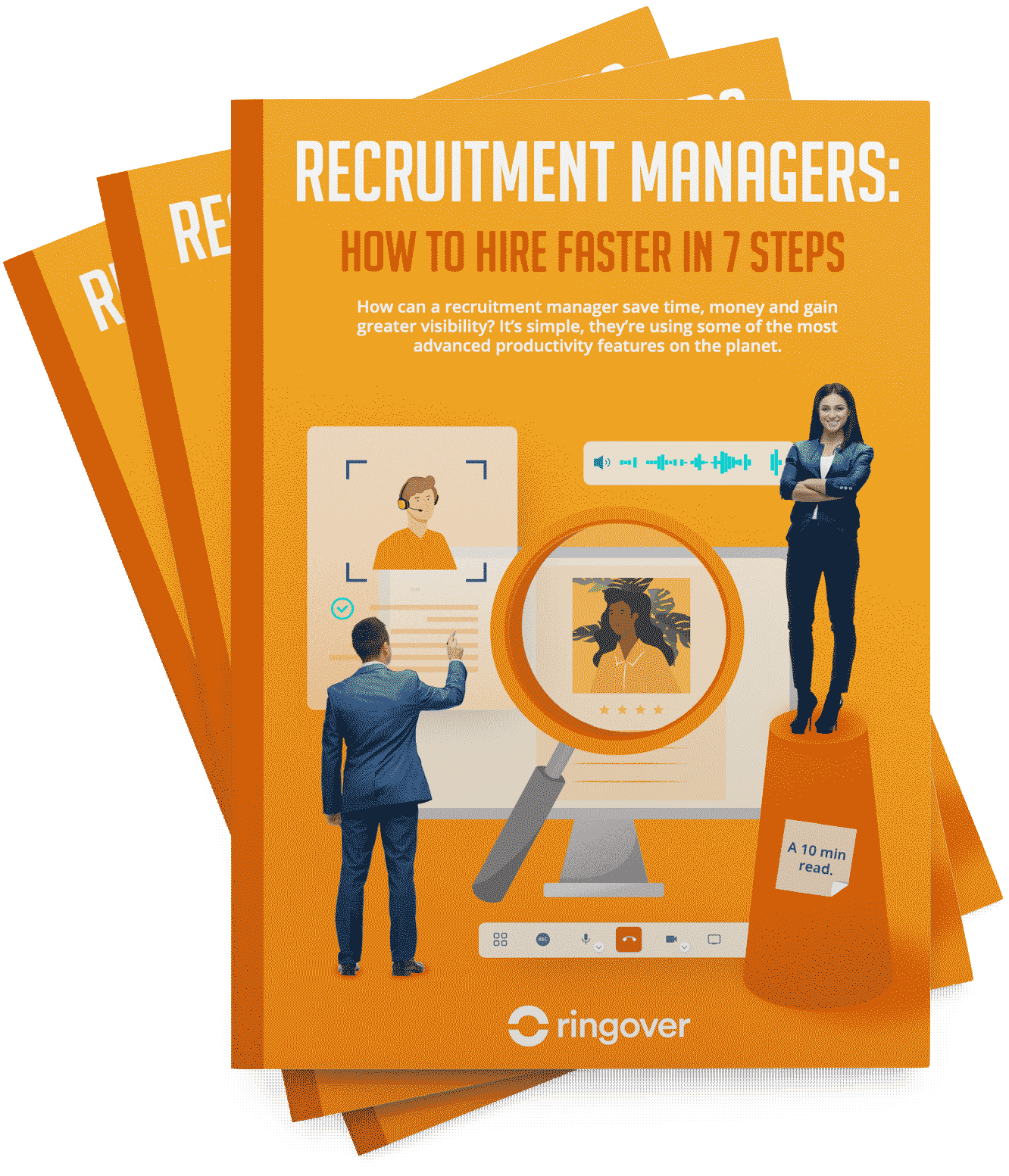Summary
- ChatGPT for recruitment? What is it?
- What are the challenges for recruitment teams?
- 12 ways to use ChatGPT to recruit more easily
- Advantages and disadvantages of ChatGPT for recruiters
- ChatGPT is not the only AI tool for recruitment
- ChatGPT for recruitment: The Final Word
- ChatGPT For Recruitment FAQ
- Bibliography
ChatGPT has become the emblem of artificial intelligence, both for individuals and for companies that continue to explore the possibilities offered by this tool.
In nearly every sector where it is applicable, ChatGPT also generates apprehension. This is also the case for recruitment.
How to benefit from it? What are the challenges of its use in recruitment?
ChatGPT for recruitment? What is it?
ChatGPT is a generative AI program developed by OpenAI capable of simulating human conversations in writing. Launched in 2022, the web application was quickly adopted by millions of users worldwide.
This language model has been trained with a massive corpus of varied texts including scripts from works (movies and TV), novels, or press articles.
It is thanks to the information extracted from this corpus that the AI is able to respond to questions and instructions (prompts) that have been transmitted to it in the ChatGPT interface.
What are the challenges for recruitment teams?
A 2023 study conducted by ResumeBuilder with 1000 recruiters highlights the fact that 82% of these professionals use ChatGPT in their recruitment process.
The use of ChatGPT is becoming normalised, however, it has a number of challenges such as data privacy, the notion of inclusion, and training recruiters to use this tool.
Data privacy
The issue of the privacy of data submitted to ChatGPT is central. Robust measures must be put in place to ensure the protection of candidates' personal information in compliance with current regulations.
It is always good to remember that ChatGPT models are not trained on the data submitted to the chat when the application's history is disabled. The same goes for the API whose parameters are adjustable.
ChatGPT models can also be trained for more specific tasks on data you provide. And on this point too, OpenAI seeks to reassure by stating that these refined models and their data are not used by the company or other companies. Nevertheless, OpenAI remains the owner of these models.
Inclusion
The second challenge that recruiters face regarding the use of ChatGPT is inclusion. Indeed, artificial intelligence, and not only ChatGPT, can be subject to biases due to the data on which it has been trained.
It is therefore important to ensure that the models and data used are regularly evaluated and adjusted in order to reduce these biases as much as possible, to avoid any discrimination against candidates.
Training to use ChatGPT
Finally, the third challenge that recruitment teams must face is training.
Recruiters must become familiar with the tool, acquire in-depth knowledge of it, stay up to date with current legislation and best practices–especially since ChatGPT is not a complete substitute for the expertise of a qualified recruiter.
Indeed, professionals must be able to evaluate, invalidate, or validate the results delivered by ChatGPT.
Simple tool or real assistant?
Given its performance, can ChatGPT be elevated to the rank of assistant?
It is true that AI is capable of providing precise and relevant answers to a wide variety of recruitment-related queries.
ChatGPT can automate tasks and its API can even be used to offer a personalised experience to candidates through precise and rapid responses.
However, as mentioned earlier, OpenAI's service cannot completely replace human expertise and skills.
Recruiters have a deep understanding of specific needs, the needs of their companies, and are capable of empathy towards candidates, which AI is not capable of autonomously.
12 ways to use ChatGPT to recruit more easily
Below, a selection of the best ChatGPT prompts for recruiters illustrated by concrete examples:
Example #1: Prompt for Boolean search on LinkedIn
ChatGPT can assist you in your LinkedIn sourcing tasks by helping you complete your queries when using boolean search.
Prompt
As a recruiter, create a query with boolean operators for LinkedIn to identify the profile of a [Insert the position] with experience in [insert experience]. The [Position] should ideally have experience in [insert field] and be based in [Insert location]. In this boolean search, include the different ways LinkedIn users describe their experience as [position] using synonyms, acronyms, and any other terms used by competitors.
ChatGPT's response

Example #2: Prompt for writing job descriptions
Writing engaging job descriptions can be very repetitive and time-consuming, especially when the HR department needs to meet ambitious goals due to rapid growth that requires hiring a large number of new talents.
Prompt
Generate a detailed job offer for a B2B account executive position in London for a SaaS solution editor named [name of your company]. The description should include an overview of the position, the main responsibilities, the skills and qualifications required, the annual gross remuneration amounting to £75,000 as well as information about the team.
ChatGPT's response

Example #3: Prompt for creating a recruitment interview outline
You want to prepare for a specific interview? Use the following prompt to get some inspirations that will help you customise the interview.
Prompt
As a recruiter in a SaaS company developing an accounting product, your task is to develop an interview outline with questions for an account executive.
They will be responsible for developing and maintaining strong relationships with existing customers, understanding their needs, and offering tailored solutions. Refer to the following job description to create the questions: [job description text]
Make sure your questions are clear, concise, and open-ended to encourage the candidate to provide detailed and thoughtful answers. Your questions should be designed to fairly and non-discriminatorily assess the candidate's technical abilities and experience, without bias for a particular gender, race, ethnic origin, or background.
ChatGPT's response

Example #4: Prompt for writing interview invitation emails
To optimise your recruitment process and avoid wasting time writing your various emails, ask ChatGPT to assist you with this task. It will be of great help to you and will help you quickly overcome writer's block.
Prompt
As a recruiter, write an interview invitation email for a candidate named [Candidate's First Name] whose profile has been preselected for the position of [Job Title]. In this email, specify to the candidate the location and date of the interview and explain to them that you will send them a second email with more details about the interview process. Emphasise that you remain available and open to any questions they may have. Use an engaging and friendly tone.
ChatGPT's response

Example #5: Prompt for creating a technical test
Finding the right test to assess the expected skills for a position is not always easy. Fortunately, you can find inspiration in ChatGPT, if you contextualise your prompt sufficiently, as in the following example.
Prompt
As a recruiter specialising in AI, your task is to develop a technical test for a python machine learning engineer. The test will assess the candidate's skills in using Python in AI to solve programming problems. It is aimed at someone with an intermediate or advanced level of competence in Python language and good experience in machine learning.The assessment should cover the following topics, among others:
- Python syntax and language features
- Backpropagation
- Algorithms
- Sentiment analysis
- Tensorflow
- Pytorch
- RNN and CNN neural networks
The test should be designed to be completed within a specified timeframe of 60 to 90 minutes, with a mix of multiple-choice questions, short-answer questions, and coding questions. The questions should be challenging, but not impossible, and have multiple levels of difficulty.
Be sure to include clear instructions on how the test will be corrected and modalities such as access to external resources, duration, and format to use (e.g., DOCX or PDF).
ChatGPT's response

Example #6: Prompt for writing a candidate rejection template
Verbally or in writing, it is not always easy to inform a candidate that their application has been rejected. Finding the right words is not easy. To help you with this task, copy and paste the following prompt into ChatGPT and adapt it freely.
Prompt
As a recruiter for a SaaS product company, write a template to inform a candidate that after careful consideration, the company will not make an offer for the position for which they interviewed. Express your appreciation for their interest in the position, acknowledge their strengths and positive qualities drawn from the notes I will provide you with: [insert notes].
Specify that this choice does not reflect their skills, but rather that it is for your company to find a better match with the very specific requirements of the position. Finally, convey your best wishes for their continued search and career. Use a respectful, sincere, and encouraging tone. The aim of this message is to make the recipient feel valued and encouraged, despite the disappointment.
ChatGPT's response

Example #7: Prompt for writing a LinkedIn post to announce a job opening
LinkedIn is an essential tool for recruiters, as it allows you to search for very specific profiles, develop your employer brand, and communicate about ongoing recruitments. By using ChatGPT, you can, for example, create your own post templates,
Prompt
You are a recruiter for a [Insert type of company, an SME, a SaaS company, a startup, etc.] that develops [product/service]. Write a captivating LinkedIn post announcing the opening of a [Insert job title] position in this company. The publication should emphasise the main responsibilities of the position, the desired skills, and how the position fits into the company's mission. Encourage interested professionals to apply and share this opportunity with their network on LinkedIn or elsewhere. The tone should be engaging and motivational.
ChatGPT's response

Example #8: Prompt for an interview preparation email for a candidate
Prompt
Write a briefing email for a candidate to help them prepare for their interview. This candidate's name is [Insert candidate's name] and has been preselected for the position of [position name] within a [Insert company type] company that develops [Insert product or service].
The message should briefly explain the steps of the interview process, namely a technical interview with the recruiting manager and an interview with two team members, potential areas of interest related to the position (such as negotiation experience, for example), and all the interview modalities, such as the video conferencing solution used (if it is a virtual interview) or the location.
The tone should be professional and intended to limit any anxiety before the interview.
ChatGPT's response

Example #9: Prompt for writing an onboarding FAQ
Even with a well-established recruitment process and a great organisation, you will always have more or less common questions from candidates or new hires. Anticipate them and be proactive by soliciting ChatGPT.
Prompt
You are part of the HR team and are responsible for onboarding new hires. Create an FAQ of about twenty questions and answers for these newcomers. This list of questions should cover common questions that new employees are likely to ask themselves. These may include administrative questions (leave, telecommuting days, expense reports, etc.), information on company benefits, setting up computer messaging, people or services to contact for specific questions, information about the company's values and culture.
ChatGPT's response

Example #10: Prompt to create a recruitment strategy
Your company is experiencing very strong growth that will need to be maintained by recruiting new employees. The next few months are therefore expected to be very intense. ChatGPT can become an HR assistant to chew on the work for you and lay the groundwork for your recruitment strategy.
Prompt
You are in charge of recruitment in a hyper-growth company. To achieve its business goals, the company will need to recruit heavily in the next 12 months and increase its workforce from 70 to 150 employees. Develop a recruitment strategy with the actions to be implemented such as hiring forecasts, recruitment planning and analysis, and onboarding issues. This strategy should also mention the productivity and efficiency of recruitment teams.
ChatGPT's response

Example #11: Prompt to create a coaching program for recruiters
You want to set up an individual coaching program for each of your recruiters, but don't necessarily know where to start? Try the following prompt!
Prompt
Imagine that you are responsible for a recruitment department with 20 years of experience and that you want to coach your recruiters so that they can fully exploit their potential. Develop a coaching program for your recruiters in which you will emphasise the following areas: recruitment skills, performance improvement, empathy. This coaching program should be designed for individual coaching. Develop each of the points mentioned above using concrete examples and KPIs when necessary.
ChatGPT's response

Example #12: Prompt for creating an internal guide for recruiters
ChatGPT can help you develop guides for your recruiters. These documents are particularly useful as they facilitate the integration of new members into your recruitment team, making them more effective more quickly.
Prompt
You are the manager of a recruitment team. To facilitate the integration of new members of this team, develop a detailed guide covering points such as needs definition, job descriptions, writing job offers, posting ads, selecting CVs, pre-qualifying by phone, interviewing, or onboarding. Make sure to be comprehensive when developing each point.
ChatGPT's response

Depending on the granularity you are looking for, you can also ask ChatGPT to develop the elements of your choice.
Advantages and disadvantages of ChatGPT for recruiters
As you have noticed, the tool developed by OpenAI proves to be rather efficient when sufficient data and context are provided. Nevertheless, despite its good student appearance, ChatGPT has some shortcomings.
In this table, you will find the three main advantages and disadvantages encountered by recruitment teams when using ChatGPT.
| Advantages of ChatGPT for recruiters | Disadvantages of ChatGPT for recruiters |
|---|---|
| Automate repetitive and time-consuming tasks | Potential for bias |
| Possible to organise and analyse large datasets | Limited comprehension of nuances of human communication |
| Reduce costs | Necessary to constantly check for errors and limit bias |
ChatGPT is not the only AI tool for recruitment
We mentioned earlier: AI is creeping into everything, and ChatGPT is not the only AI tool you have in the recruitment sector.
Empower for conversational analysis ✅
Empower is a conversational analysis solution powered by AI that can summarise or fully transcribe telephone or video recruitment interviews.
The idea is to be able to extract relevant information from these interviews and facilitate decision-making through features such as mood analysis, conversation topic identification, and exchange analysis (turns of speech, speaking time, interruptions, etc).
Empower can also be used by managers to control the relevance and consistency of speech during recruitment campaigns.
PeopleGPT ✅
The second tool we wanted to introduce you to is called PeopleGPT, analogous to OpenAI's service. Developed by the company JukeBox, PeopleGPT is both a profile search engine and an assistant.
For example, you can initiate a candidate search by importing a job description or "converse" with the virtual assistant to refine your query or analyse the results more thoroughly.
Factorial AI ✅
Factorial is a SaaS HR software editor present in more than 65 countries. Recently, the editor integrated artificial intelligence into its various solutions. Its AI assistant allows you to improve your team's task allocation with just one click or to find the ideal profile for a position from your talent pool.
ChatGPT for recruitment: The Final Word
ChatGPT can be a valuable ally for recruitment teams as it facilitates certain steps of the recruitment process. Through the 12 prompts listed in this article, you have been able to see the possibilities offered by ChatGPT to recruitment specialists.
However, despite its undeniable performance, using ChatGPT in recruitment has some limitations.
Moreover, ChatGPT is not the only artificial intelligence tool available to recruitment professionals. There are other powerful AI tools such as Empower or PeopleGPT.
You have the opportunity to test Empower for free to assess how it can contribute to improving your performance and the quality of your interviews.
Such tools have great potential and can truly transform your recruiter experience as well as that of candidates.
Nevertheless, whatever solution you choose, make sure it is compatible with your other tools (such as your CRM or your phone system) and that it complies with current regulations, particularly regarding data protection.
ChatGPT For Recruitment FAQ
Can ChatGPT be used for CV parsing?
Indeed, you can use ChatGPT for CV parsing. The tool can help you extract and interpret data.
ChatGPT can analyse specific sections of CVs and list the most relevant information found according to criteria you will define.
However, the use of ChatGPT can also raise concerns about privacy. These aspects should not be overlooked and require appropriate management.
On this point, OpenAI assures that the data imported by users into ChatGPT is not reused by the company if Chat history is disabled. Therefore, be careful and make sure to comply with current regulations if you want to do parsing.
What are the best practices to follow to maximise ChatGPT's effectiveness in recruitment?
To fully exploit ChatGPT in your recruiter's daily life, here are some best practices to apply:
- Be precise in drafting your prompts. It is necessary to contextualise each request to obtain reliable results.
- Be aware that ChatGPT cannot replace a human recruiter. The tool does not have empathy and does not understand the nuances of human language, even if some of its responses seem stunning.
- It is important to systematically check ChatGPT's responses. Some may be incorrect and incomplete.
Bibliography
- https://www.resumebuilder.com



